
Creating Value
Responsibility and Governance
Maintaining sound corporate governance
The Group owes its prudent growth to good governance practices. Our affairs and resources are managed with the utmost intellectual honesty and diligence. As we journey towards achieving our strategic objectives, we ensure that due care is always given to corporate ethics and social responsibility.
The Group’s affairs are collectively directed by the Board of Directors who are completely aware of and knowledgeable about their role in ensuring its prosperity. Having pledged to take full responsibility for its actions, the Board ensures that executive authority is passed on only to those who live the Values of Sunshine Holdings.
Ensuring that reporting systems and processes are adequate and effective in providing the necessary overall control is another responsibility that the Board takes very seriously.

Along with our subsidiaries we are committed to upholding the highest ideals of corporate stewardship.
Across the Group we follow a “Code of Conduct and Ethics” that applies to the Board of Directors, Management and employees. The Code’s level of compliance is monitored through an annual audit carried out by the respective business units and at the holding company level. During the year under review, no violations of the Code were recorded across the Group.
The Group also complies with all applicable mandatory and voluntary requirements. This includes the regulations prescribed by the Securities and Exchange Commission of Sri Lanka, the Continuous Listing Rules of the Colombo Stock Exchange and the directives of the Companies Act No. 07 of 2007. No violations of the Corporate Governance Code for listed companies were recorded during the reporting year and we were not subject to any fines or non-monetary sanctions for non-compliance with rules and regulations.
The Board takes responsibility for ensuring that the Group’s people strategy is effectively implemented, under the purview of the Human Resources (HR) Department. The continuous improvement of employee-related processes and procedures is also the responsibility of the HR division (refer Human Resource compliance on page 40 for more details). HR’s performance is assessed by the Board and the Group Managing Director. We comply with all regulatory requirements relating to its Human Capital going above and beyond basic requirements.
Fortifying manufactured resources
Our manufactured capital includes buildings, vehicles and equipment often used directly for the benefit of customers and other stakeholders. As we continue to grow so too will our manufactured capital.
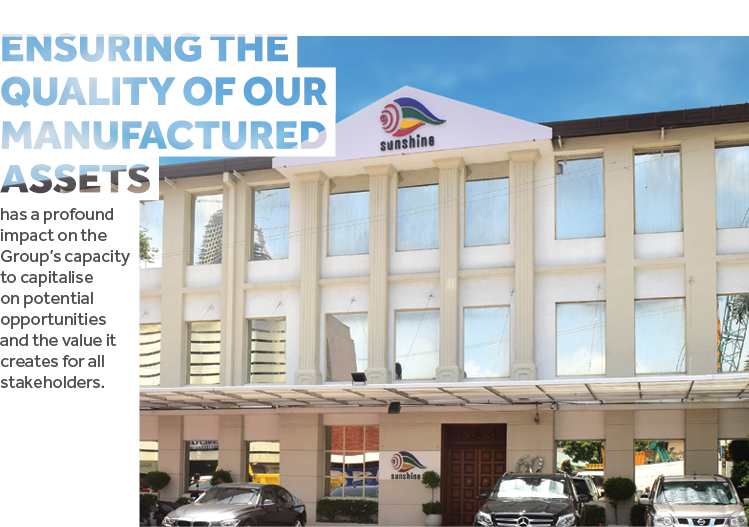
In addition to meeting stakeholder expectations, we use such tangible assets to meet future challenges. Ensuring that the value we derive is at a premium means conducting due diligence
and making every effort to develop and continue to maintain the high standards of our
manufactured capital.

During the year under review, we invested Rs. 0.8 Bn. as capex on a consolidated level. (Refer pages 104 and 105 in the Financial Statements for details.)
Intensifying our social capital
While sustainability lies at the heart of all we do at Sunshine Holdings, it is most strongly on display in our agribusiness sector. While our employee cadre in agribusiness is around 10,000 – the largest of all our sectors – an additional 48,000 people live on our properties and we work closely with around a further 64 villages in the vicinity. Uplifting their lives through the maintenance of roads and infrastructure, the building of houses, the provision of electricity, the organisation of medical clinics, and contributions to schools and places of worship has helped us maintain mutually beneficial relations with the communities within which we operate.
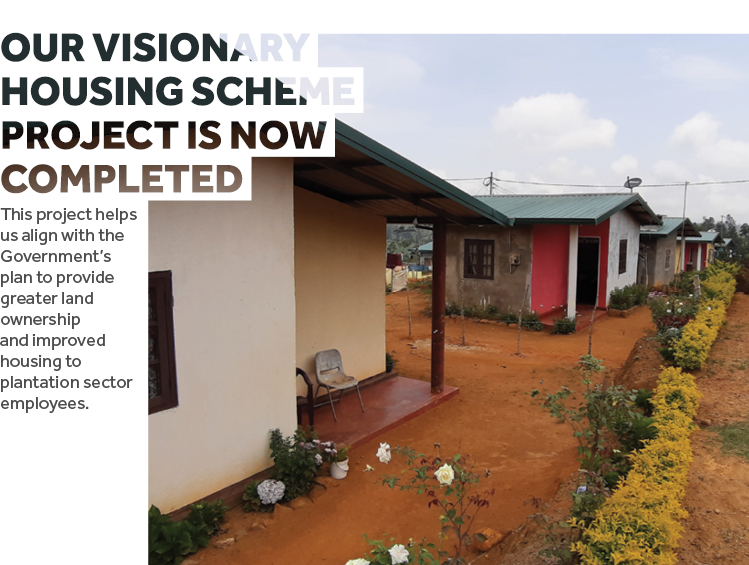
Community engagement
Over the past 50 years we have built a legacy of responsible entrepreneurship, working diligently to expand this basic principle into all aspects of our business by creating better living conditions and providing a higher quality of life.
In good times and bad we remain supportive of the communities within which we operate, with our Executives and Managers being present for community weddings and funerals alike.
Taking this further, as an extension of our Outbound Training Programme the Watawala Tea Ceylon team participated in the painting of two buildings and cleaned the large outdoor compound of a school in Akarawita. The team also attended to repairs to the school’s IT lab in order to get the lab in a reasonable running condition.
Community recruitment
While recruiting the best person for each vacancy within the Group is a priority for us, we make every effort to recruit directly from the communities within which we operate – especially for our agribusiness and healthcare sectors.
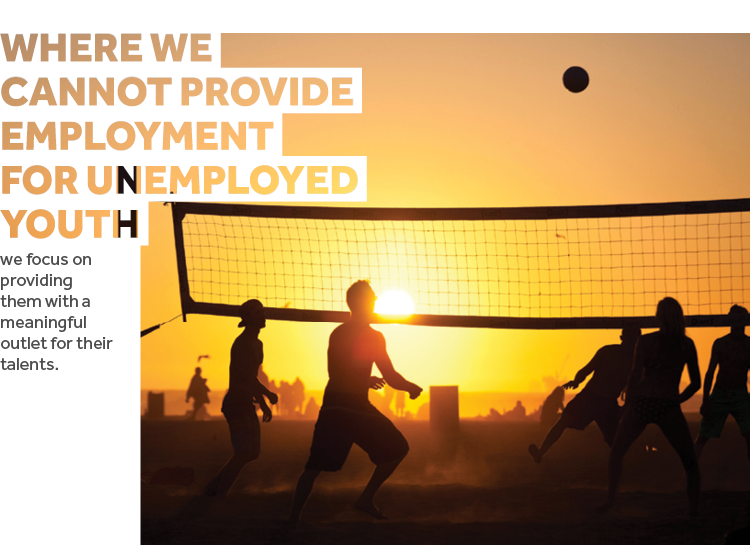
Working closely with the national federations for volleyball, table tennis and badminton we hired top quality coaches and built courts for all three sports in community areas. Together with the community we will work towards reinforcing the national squads through our sports initiatives.
Policy advocacy
As a responsible corporate citizen, we take it upon ourselves to give voice to the concerns of the community, using our contacts in the business and other arenas to ensure that their issues are escalated to the necessary authorities and firm action taken. In our advocacy role, we also work to address social issues that are relevant to our businesses and which have wider implications to society.
Safeguarding our natural capital
Comprising natural resources including water, soil, flora, and fauna, our natural capital consists of the resources that people and animals depend on to live and function. Distinct from other forms of capital most natural resources are limited and need to be conserved for future generations.
As a responsible corporate citizen our focus continues to be on using our natural resources in a sustainable manner and taking responsibility for the stewardship of our planet.
Minding our plantations
Giving due consideration to the environment has always been a priority at Sunshine Holdings. From ensuring the safe and proper disposal of drugs to the sustainable management of the lands we own and manage we have always adhered to the highest standards. While this has made the Group attractive to many overseas business partners, our association with them has helped to push our standards even higher.
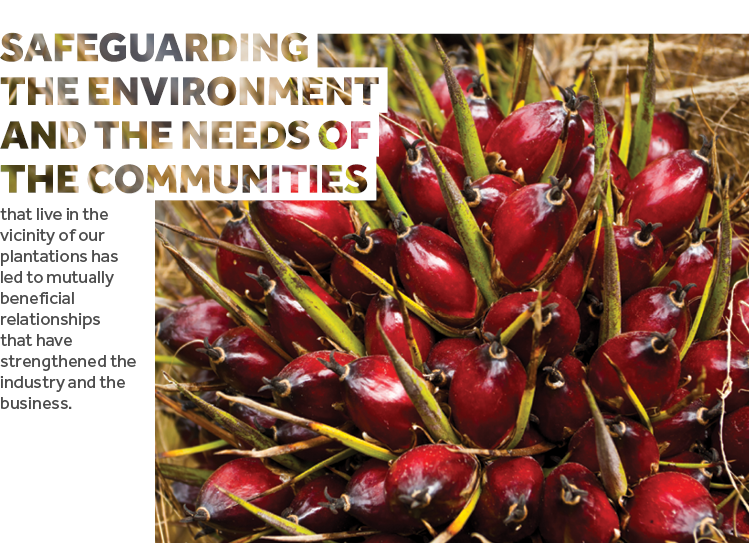
A good example of our sustainable ethos is our palm oil plantation, which has received regulatory approvals despite anxiety on the part of national authorities who worry that the environmental damage that has plagued other countries in the South East Asian region may affect Sri Lanka as well.
Like our tea plantations, our palm oil plantations are run sustainably with due care given not only to the environment but also to the communities of the area.
Village integration and environmental safety are key factors in our environmental strategy. A majority of our recruits are people from the area who are provided with training and development which improves their ability to maintain the high standards that we insist on while also improving their own skills and marketability.
Thanks to our detailed study of the land under our care we were able to identify which areas were more suitable for planting and reserve those that were not for forestry. We also identified the different types of waterways across our lands and the different types of soil. Following this study we are now able to make environmentally sound business decisions about our agribusiness sector.
Focusing on renewable energy
Our foray into the energy sector was organic – a result of our sustainable ethos and our tradition of looking for innovative ways to responsibly utilise resources. Waltrim Hydropower (Pvt) Ltd., and Upper Waltrim Hydropower (Pvt) Ltd. operate the two mini-hydropower plants in Lindula, Talawakelle, while our latest mini-hydropower plant in Lippakelle estate is under a new subsidiary, Elgin Hydropower (Pvt) Ltd.
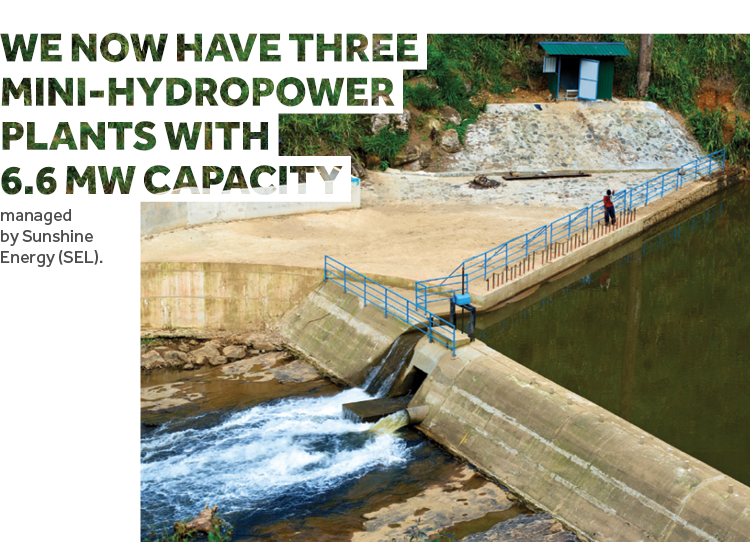
Our hydropower business benefits from the strong working relationship we have with Global Hydro Energy (GHE), our Austrian business partner. Through GHE we enjoy technological innovations such as single window viewing screens through which we can monitor how much power is being generated at each of our plants. With the entire power generating process streamlined, we are able to run a successful business with just 36 employees, provided that there is enough rain in those areas.
Expanding on sustainable energy opportunities, we installed our first rooftop photovoltaic system in Kelaniya. With a capacity of 0.5MW (500kW), the solar panels are expected to generate around 65,250kWh of electricity every month. Spanning an area of over 35,000 sq ft, our newest green initiative will result in an annual net carbon emission reduction of 532MT of CO2.
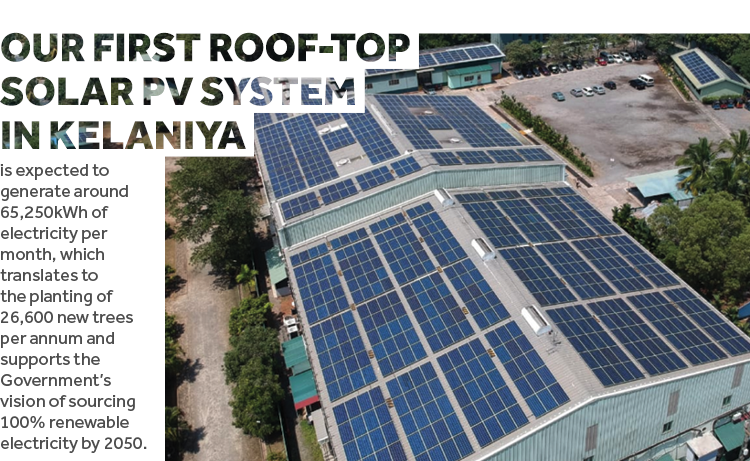
While we have shelved the idea of adopting stand-alone solar power panels as it is cost-prohibitive, our venture into rooftop solar panels is proving successful. Working closely with JSF Corporation – a wholly-owned subsidiary of REK CO., LTD. in Japan and a registered BOI company in Sri Lanka – we have been receiving valuable technical advice in nurturing our nascent solar power project. This business partner recently became Sri Lanka's first manufacturer of solar panels and commenced manufacturing operations at their production facility in the Katunayake Export Processing Zone.
As a Group we have already identified roofs across our properties that could generate capacity of over 2MW. Our plan is to scale this power generation up to 4MW in the near future. Over the next few years, SEL will be looking for more opportunities within the solar space – either through organic investments or through strategic partnerships. Along with the power generated by our mini-hydropower plants this will take our capacity to around 15MW, on par with other players in the renewable energy space.

